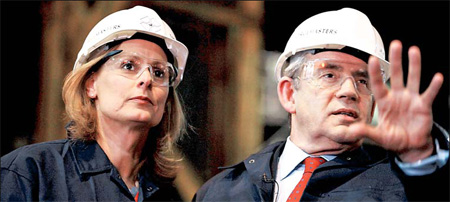
Britain's Prime Minister Gordon Brown and his wife Sarah visit Sheffield Forgemasters in Sheffield, northern England, as the campaign counted down to election day. Jeff J. Mitchell / Reuters
No party likely to win outright majority
LONDON - British Prime Minister Gordon Brown's Labour party gained an opinion poll boost on the final day of campaigning ahead of Thursday's election, but three national newspapers came out in support of opposition parties.
 Britain's Prime Minister Gordon Brown and his wife Sarah visit Sheffield Forgemasters in Sheffield, northern England, as the campaign counted down to election day. Jeff J. Mitchell / Reuters |
Conservative leader David Cameron campaigned through the night and Brown made an early visit on Wednesday morning to market workers in northern England to woo the one-third of voters said still to be wavering. A YouGov poll for the Sun newspaper suggested the center-right Conservatives' momentum had stalled, putting them unchanged on 35 percent, while center-left Labour rose to 30 percent.
The quirks of the British electoral system, in which voters elect a member of parliament from their local constituency, mean that these figures would allow Labour to remain the biggest party, but short of a majority in parliament.
Labour has been in power since 1997, but has been battered by recession and public anger over a parliamentary expenses scandal that has tainted all the main parties.
A ComRes poll for the Independent newspaper put support for the parties unchanged, with the Conservatives 8 points ahead of Labour, making David Cameron's opposition party the largest in a 650-seat parliament, but denying him outright control.
Both polls suggest a 'hung parliament', in which the centrist Lib Dems could hold the balance of power.
Britain has not had an inconclusive election of this kind since 1974 and is not used to the kind of coalition-building familiar to many countries in continental Europe.
Two senior Lib Dem party members said on Wednesday they would work constructively with whoever the British public decided should lead the country, but reiterated their view that they could not support a party that won the most seats despite coming third in votes.
Reuters